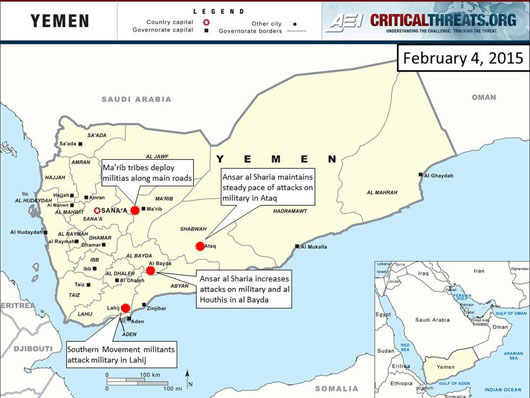Negotiations to reach a political settlement in Sana’a collapsed when Yemen’s main political parties withdrew from talks, indicating that they would also reject any initiative from the al Houthis. It is not clear whether there is a resolution to the political crisis that all factions would accept.
Yemen’s political factions failed to reach a political solution before an al-Houthi- imposed deadline for talks to end on February 4. Negotiations brokered by the UN Special Envoy to Yemen Jamal Benomar broke down after al Houthis and political actors disagreed over two competing plans to fill the presidency and premiership. The al Houthis favored a plan to form a presidential council while other political factions favored a plan to have parliament vote on President Abdu Rabbu Mansour Hadi’s resignation. The al Houthis also demanded that their fighters be integrated into Yemen’s security forces as a precondition for negotiations. It is likely al Houthis will push to form a presidential council to take over Yemen’s executive branch.
Ma’rib tribesmen are mobilizing to combat an expected al Houthi incursion into the governorate. Ma’rib tribes deployed militias to one of the governorate’s main roads on February 2. The tribesmen have threatened to destroy Yemen’s main oil and electricity lines should the al Houthis try to take tribal lands. It is possible some of the tribesmen are receiving support from al Qaeda in the Arabian Peninsula (AQAP).
AQAP’s insurgent arm Ansar al Sharia is increasing attacks on the military in al Bayda, south of Sana’a. Ansar al Sharia militants simultaneously attacked a Special Forces encampment in al Bayda city and the 117th Infantry Brigade west of the al Bayda city in Mukayras on February 1. Three soldiers died in the attacks. A suspected U.S. airstrike hit an Ansar al Sharia vehicle nearby in Masawrah, al Bayda on February 2. Separately, Ansar al Sharia killed one soldier during an attack on a military barrack in Azzan, Shabwah on February 3.
Southern Movement-linked militants escalate attacks in the southern governorate of Lahij. Militias linked to the Southern Movement fought with security forces in al Hawta, Lahij on February 1. A roadside improvised explosive device injured four soldiers there on February 2. Unidentified gunmen robbed a bank on February 3 also in al Hawta.
Secretary of Defense nominee Ashton Carter said that the current Yemeni political conditions require a re-evaluation of the U.S. strategy in Yemen. Carter signaled in written responses ahead of his Senate Armed Services Committee confirmation hearing that the continued political crisis risks affecting Yemeni counter-terrorism efforts against AQAP.
The failure of political actors to reach an agreement in Sana’a and continued al Houthi control of the government increases the chance southern governorates will push for secession. AQAP will likely benefit from the political unrest and expand in southern territory.
← PREVIOUS |
NEXT → |

